Together with the announcement of our free mainlining offer in our Linux kernel and bsp development services, we are pleased to announce the availability of new conference videos.
The CELF Embedded Linux Conference Europe (ELCE) and the NLUUG Autumn Conference on Mobile Computing took place last November in Ede, in the Netherlands.
For those who don’t know them yet, the Embedded Linux Conference (ELC) and ELCE are in our opinion the most interesting conferences for embedded Linux system developers. They cover only interesting topics, such as power management, boot time, flash storage, security, graphics, mobile applications and many more.
This time, four people shot videos: Ruud Derwig (NXP), Tim Bird (Sony), Thomas Petazzoni and Michael Opdenacker (both from Bootlin). Then, Thomas took care of reading the tapes and DVDs, and encoding them to Ogg/Theora, all this in just a few minutes of manual intervention, thanks to his super automated scripts.
Here are all the videos:
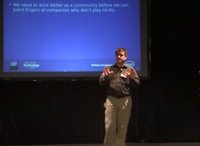 Opening, by Tim Bird and Armijn Hemel
Opening, by Tim Bird and Armijn Hemel
video (6 minutes, 50M)- How chip makers should (not) support free software, by Harald Welte (Independent)
video (52 minutes, 206M) - Choosing free software graphical libraries for embedded systems, by Thomas Petazzoni (Free-Electrons)
slides, video (41 minutes, 188M) - Using ‘Dot Clock’ displays in embedded Linux devices, by Vitaly Wool (Embedded Alley Solutions)
video (37 minutes, 205M) -
Digital television with Linux – architecture and opportunities, by Bas Engel (Philips)
slides, video (53 minutes, 187M) - Managing NAND longevity in a product, by Matthew Porter (Embedded Alley Solutions)
slides, video (56 minutes, 535M) 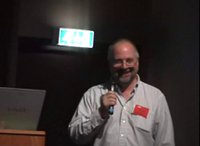 A corner-to-corner approach for cost-effective implementation of consumer electronics human machine interfaces, by Andrei Smahlei (Synesis Vision)
A corner-to-corner approach for cost-effective implementation of consumer electronics human machine interfaces, by Andrei Smahlei (Synesis Vision)
video (21 minutes, 156M)- A quart into a pint pot: porting uClinux to small micros, by Peter Griffin (MPC Data)
slides, video (40 minutes, 204M) - Update on filesystems for flash storage, by Michael Opdenacker (Free-Electrons)
slides, video (39 minutes, 116M) - Rich GUI without pain, by Gustavo Sverzut Barbieri (ProFUSION)
slides, video (57 minutes, 361M) - Embedded magic, or how people suddenly find out that they are collaborating, by Gregers Petersen (Copenhagen Business School)
video (45 minutes, 229M) - Solar hot water geekery: making infinitely versatile home heating controllers with free software and open hardware, by Wookey (Aleph One)
video (51 minutes, 124M) 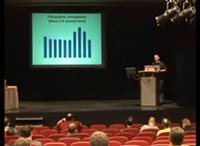 Taking Linux power management to production quality, by Eugeny S. Mints (Embedded Alley Solutions)
Taking Linux power management to production quality, by Eugeny S. Mints (Embedded Alley Solutions)
video (53 minutes, 208M)- Tools and techniques for reducing bootup time, by Tim Bird (Sony)
slides, video (50 minutes, 208M) - Avoiding web applications flaws in embedded devices, by Jake Edge (LWN.net)
slides, video (41 minutes, 180M) - Adventures in real-time performance tuning, part 1, by Frank Rowand (Sony)
slides, video (58 minutes, 297M) - Adventures in real-time performance tuning, part 2, by Frank Rowand (Sony)
slides, video (59 minutes, 185M) - Using the appropriate wear leveling to extend product lifespan, by Bill Roman (Datalight)
slides, video (41 minutes, 193M) - Abusing UPnP, by Armijn Hemel (Loohuis Consulting)
slides, video (46 minutes, 382M) 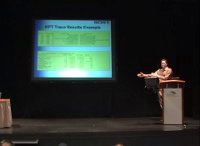 BlueZ 4.0, by Marcel Holtmann (independent)
BlueZ 4.0, by Marcel Holtmann (independent)
video (49 minutes, 114M)- Device Tree’s in Linux, by Vitaly Bordug (MontaVista)
slides, video (43 minutes, 279M) - Building bridges – coherence, a DLNA/UPnP framework, by Frank Scholz (independent)
video (46 minutes, 196M) - Overview of SquashFS, by Philip Lougher (independent)
slides, video (51 minutes, 225M) - Portability and optimization of GNU / open source applications with ARM embedded Linux, by Vasileios Laganakos (ARM)
slides, video (45 minutes, 235M) - NAND chip driver optimization and tuning, by Vitaly Wool (Embedded Alley Solutions)
video (40 minutes, 141M) - Building Embedded Userlands, by Nedjelko Miljevic and Klaas van Gend (Montavista)
slides, video (45 minutes, 384M) - Power management on an ARM11 platform, by Mischa Jonker (NXP)
slides, video (39 minutes, 150M) - Linux connection manager, by Marcel Holtmann (Intel)
video (55 minutes, 230M) - Suspend modes and power management on Linux, by Stefan Seyfried (Suse)
video (45 minutes, 145M) 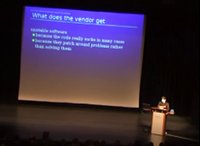 Coreboot, by Peter Stuge (Konsult Stuge)
Coreboot, by Peter Stuge (Konsult Stuge)
video (43 minutes, 135M)- Socket aware change of IP address, by Samo Pogacnik (Iskratel)
video (32 minutes, 70M) - Embedded maintainers: Community and Embedded Linux, by David Woodhouse (Intel)
slides, video (47 minutes, 241M)
Speakers were supposed to post their slides on the CELF Wiki, but some of them haven’t done it yet.
If you don’t know which video to start with, here are the talks that Thomas Petazzoni and I preferred:
- Embedded maintainers: Community and Embedded Linux, by David Woodhouse
- Tools and techniques for reducing bootup time by Tim Bird
- Adventures in real-time performance tuning, by Frank Rowand
- Overview of SquashFS, by Philip Lougher
- How chip makers should (not) support free software, by Harald Welte
- Rich GUI without pain, by Gustavo Sverzut Barbieri
Of course, these are just our personal recommendations, from the talks we managed to attend. We are sure that many other ones are worth recommending.

 .
.